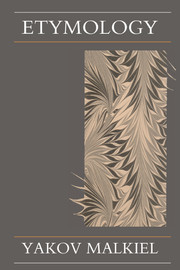2 - The first half of the twentieth century
Published online by Cambridge University Press: 05 June 2012
Summary
So far, we have managed to describe the shifting positions of etymology, at first outside the edifice of historical grammar and later on in close connection with it, in splendid isolation from political events and social changes as it were, with practically no reference to such real-life situations as the Napoleonic Era, the Crimean War, or America's Civil War, to cite three examples at random. In this undertaking we have received support from the oft-cited fact that, between 1871 and 1904, Europe went through a protracted period of relative peace – of respite from involvements in serious wars and from all sorts of revolutionary concussions.
But as one approaches the next half-century, things begin to undergo a radical change, not necessarily for the better. The period 1900–1950, at present visible in clear retrospect, was marked by two world wars which were not only exceptionally devastating, but were also characterized by all sorts of ideological implications and by energetic reshuffling of centres of intellectual prestige. Allusions to the impact of changes of such magnitude can no longer be swept under the carpet. The fortunes of historical linguistics and of etymology alike were very strongly and, I repeat, by no means always favourably affected by the resulting redistribution of intellectual ammunition.
It should suffice, in this context, to mention two influential circumstances. First, by 1900, the reputation of German scholarship, both pure and applied, stood at its zenith the world over.
- Type
- Chapter
- Information
- Etymology , pp. 41 - 104Publisher: Cambridge University PressPrint publication year: 1993

